Last February I approached Tony Dias for an interview about his involvement in and thoughts about the Dark Mountain Project. This turned into a series of dialogues about his work and my own, a process of mutual sense-making. In this process, we have gradually arrived at an increasingly shared language and understanding of what we are doing. Finding community seems like an appropriate headline for this. Here, we open up this dialogue for others to enter, in the same spirit of gift as some of the previous conversations that have been published here. A note on how this written version of our spoken interaction came to be: after producing a literal transcription of our recorded conversation I sent this to Tony who then edited it, and in a further couple of exchanges back and forth, we produced the below version which stands as an accurate translation of the first part of our conversation. We have added italics where we feel emphasis is needed and linked to some of the concepts and ideas that are woven into the dialogue for clarity.
JDG: One of the recurring themes in these dialogues about the Dark Mountain Project is conversation, and I’m interested in the dynamics and how people come into this conversation. How do we arrive at a new, or more accurate, language and how can we begin to describe what’s going on using fresh metaphors? I see Dark Mountain as a catalyst for these conversations and new concepts.
How did you find Dark Mountain?
TD: I don’t remember what led me to their website, though I vividly remember reading the manifesto. I felt a powerful synchronicity, a sense of having stumbled upon just what I needed. I passed from a profound isolation, preoccupied with concerns no one seemed to share, to discovering a network of people with whom I shared a common language.
There was a compelling clarity in asking,
“What do we do when we stop pretending?”
It touches the heart of our situation!
So much has changed! It’s hard to imagine how invisible these concerns appeared just a few years ago. There was an all-pervasive atmosphere of seamless denial. Their manifesto helped validate my own concerns as it provided me with a shared vocabulary with which to approach others.
“What do we do when we stop pretending?”
We can ask this of anyone!
We might not get an answer, but at least we’ll dent the crust of denial. Who knows! We may crash through to the main point.
I linked sites. They cross-linked with my blog. I began commenting, one thing led to another. When the festival was announced I had this crazy feeling I had to go. When they added a week-long camp preceding the festival, I ran out of excuses. I don’t undertake travel lightly. It’s not something I can easily afford.
I needed to be there.
I arrived on Monday afternoon to find half a dozen strangers milling about. In a few days there were thirty, then forty, of us. Coherence established itself in a variety of ways. Relationships developed as we lived rough together over the course of the week. The festival brought hundreds at the weekend, but for me, it was a denouement. The camp mattered most. There had been a wonderful conviviality. Interwoven conversations developed as we worked; building a bender and a hexayurt; gathering around a fire each night into the wee hours. I got to know a number of people I would never have met any other way.
I’ve never belonged to any artistic or literary movement, short of that feeling we all get in college reading Sartre, and thinking, “I’m an existentialist!”
My perspective shifted. I felt this group’s dynamic fit. I had a recognition of finding a place where I might be useful, able to help others. It seemed clear that Dark Mountain was not intended as simply another movement.
Movements bring distraction and discord. They are intimately tied to coercion, perpetuating shared illusions instead of helping us engage with reality. Everyone’s focus devolves into defending preconceived notions. An ideology develops. Its needs become paramount.
Dark Mountain appeared to be something else, a collection of people recognising an overlapping of perspectives, not another attempt to aggregate people into a commodity.
I haven’t returned. I don’t plan to go again, don’t feel a need. I worry Dark Mountain’s energy might turn to the business of promoting festivals or striving to meet the agendas of its directors, in short, that it will succumb to the pressures that have always de-railed significant moments by turning them into movements.
If this happens, it won’t remain something I want to give attention to. I’m not interested in drawing others along that kind of path. Such an effort returns us to business-as-usual. What’s important to me about this group of people is their promise. I want to maintain connections with those I can share thoughts with, share concerns, discoveries, articulations, hints; so as to follow glimmers of what we find going on inside us, between us, and in the wider world.
JDG: I have had a similar experience in various movements, becoming disillusioned, tiring myself out, running myself up against a wall. I have this sense that Dark Mountain is different. I don’t even know if movement is the right term. After having been involved for a while I am still not quite sure how to put it.
What is Dark Mountain?
It is clearly a space people step into. A physical place, in terms of the festival. Also, a materially manifest place in its journal and other writing. But, it is clearly more than this.
TD: I’m leery. I did see Dark Mountain as a banner, considered it as a place. The more things evolve, I’m not sure. It does represent a significant phase. It has been a signpost, a rallying flag at a specific moment in time. These are useful, tremendously valuable contributions. They are also, necessarily, fleeting. This doesn’t discount Dark Mountain. It does change my perspective towards it. I haven’t referred to Dark Mountain or uncivilisation in my own writing for a while.
A valuable signpost quickly devolves into a label. It’s not anyone’s intention. It’s difficult to remain in-the-question and not take a title, in itself, as an answer. It becomes attached to various assumptions. We loose any sense of what it might mean. We risk getting stuck, either challenging assumptions, over and over again; or defending it’s validity in competition with other ideologies. Beyond that, a term like un-civilisation, any negative terminology, has a limited usefulness. They keep us defensive, in a reactive posture. Our thinking looses fluidity, it concretes around our flag.
Krishnamurti had a foundational insight,
“All we have is our attention.”
If our attention is fixed on a preexisting notion of anything, we remain in a binary relationship with everything. We see everything through a narrow lens, looking for agreement or opposition to our ideological position. This is wasted attention. It doesn’t matter how laudable the goal. Movements, any gathering-together around ideas or power, make it easy for us to jump to conclusions.
We insist,
“We’re all together! Go this way!”
We stop questioning. We enter herd management.
There is an implication of an agreed-upon end. This leads to arguments over means.
Dark Mountain’s promise resides in an explicit denial of this as a useful goal. Once we devolve into arguing means and ends, we have lost. What I’m discovering, and by discovering I mean finding for myself, not discovering like Columbus, are concerns revolving about intention and attention. These point towards a need to suspend inherited habits.
Over the last few months I’ve been finding value in simply standing, feeling balance within my particular location, within my organism. If it’s good for me, it may be so for others. I have a deepening distrust of aggregation, the commodification of people. It is destructive.
JDG: I was inspired by your post Rivers of Blood which was a response to Paul Kingsnorth, David Abram and Lierre Keith’s live debate in Orion Magazine. Listening to their conversation brought out all these emotions, threatening to plunge me back into despair. But then, I realised, I don’t have to go there. This realisation helped me step back and I felt a release. Reading your post I felt like you had a similar reaction and this helped me understand that despairing internalises the violence around us.
From my perspective, from another continent, it seems as if your recent posts have changed. There’s a more meditative feel. They appear to come from a different place.
What has this been like for you?
TD: Thank you.
Let me begin all the way back in Llangollen, Wales, a year and a half ago. Dougald and I discussed Derrick Jensen’s work, agreeing that his insights into the relation between personal abuse and the enormity of our situation are indispensable. But we shared a feeling that there’s something missing in his “call-to-arms”. It’s not as obvious a response as he makes it out to be. We couldn’t express why at the time, beyond a vague reservation.
I didn’t hear all of what Kingsnorth, Abram, and Keith had to say. The first half had quite a bit of Abram. I admire his work. The title of my blog, Horizons of Significance, leapt out at me as I read The Spell of the Sensuous.
When Lierre Keith brought in a tone of righteous indignation a visceral dread arose in me, just as you’re describing. I couldn’t listen. I skipped ahead. I happened to catch a fragment, I think it was Abram saying, “rivers of blood”..
This is going to be a long answer!
JDG: That’s fine!
TD: In 2001 I began writing Shoal Hope. I had always written, but something changed then. This was – and this will connect later on – when I left a chronic depression that had plagued me from as far back as I can remember. Cognitive therapy had led to a breakthrough.
There is a core insight in it. If we act differently we will feel differently. This affects our neurons. We develop new tracks, leaving deep ruts of longstanding habit behind. For the first time, depression didn’t just recede, it let go of me, disappeared. I can see why people say they are born again! There was a profound sense of beginning.
It changed my approach to creative writing. My relationship with painting had always been plagued by mono-mania, a queasy narcissism, spoiling any accomplishment. It sent me soaring to untenable heights or down into the abyss. I was unable to simply deal with what appeared on its own terms.
As I wrote it became clear that my Ego was not responsible for what appeared on the page. I was writing. I found words, but the process unfolded on its own as a text unwound before me. I could not claim it as mine. I was a collaborator in the result.
Since then, I’ve been looking at how to inhabit and explore this place from which creativity arises of its own accord, maintaining a trajectory of its own. Decisions are made, but they are not my choices.
Jensen has done an incredible job laying out the connections between personal trauma, abuse, and its effects on the individual; and that our experiences of abuse within family relationships mirrors what occurs in society at large. The same mechanisms are at work. This resonates with me. I have shared his sense of being trapped in victimhood and caught in double-binds. I struggled with this most of my life.
Recognising these connections is tremendously liberating. But, if we do not go further, we miss an incredible opportunity. Krishnamurti and Bohm’s contributions have been a bridge. They apply proprioception to our emotions, our thoughts, and conditioning.
They ask,
“What if we suspend our typical reaction?”
What really goes on when we say something like,
“They make me so mad!”
No one makes us mad. We bring on our own anger.
Organism’s are selfish. Selfish in a positive, healthy sense. They just don’t squander the level of intensity we lavish on anger and rage. It isn’t worth it, unless it’s about us. We lose sight of this.
Bohm gave the example of a stroke victim. She cannot feel her limbs on one side. She awakes in the dark fighting off an attack. She doesn’t realise that her own arm is striking her, provoking her to lash out in panic. As her own hand hits her harder and harder she is caught in an escalating feedback loop.
Our negative emotions operate this way. Unless we realise their source, we fail to see that we are responsible. This misunderstanding leads to great suffering.
Bring this insight to Jensen’s work. If his rage against his abuser doesn’t arrive at compassion, it will only repeat the cycle. Maybe not by abusing children. But, striving to convince young people to blow things up, at whatever cost to themselves and everything else out of anger, can only perpetuate abuse. My righteous indignation is another’s act of random violence. All this, before we consider whether his requests are suitable actions with predictable results.
We miss a joyful disillusionment. We assume disillusionment is a tragedy. We recoil from considering it. In my experience, it brings a tremendous release of joy and energy. Illusion shackles us to futility. Removing illusion liberates us from futility, leading to meaningful freedom. Otherwise, we are trapped in repeating old patterns, adding victims, in a headlong rush seeking our own righteous vengeance.
These considerations led to Rivers of Blood. It arrived from that place of creativity beyond a sense of self. Another world opening up beyond this question of how to end abuse, not just pass it along.
This watershed brought a pause, brought me into another landscape. I’m just beginning to look around and discover how to enter it.
JDG: That sounds great! It connects with some of my thoughts about where these conversations are taking us.
Paul and Dougald are explicit in the manifesto about Dark Mountain being a cultural project intended to shift world-views, without violence, towards a wider, ecocentric perspective. There have been many metaphors for this. For example, Dougald talks of how we learn to play a different sort of game.
This also came out in my conversation with Andrew Taggart. He talks about settling and settlement. How we come to be OK with how the world is.
Underlying all these conversations is a sense that we are moving away from any single logic. We realise that if we remain inside any specific kind of logic, within any specific way of thinking about the world, we are trapped. We need to step into uncharted territory. It’s not clear exactly what this is and how we do it! But we seem to be guiding each other along in these conversations.
TD: In the natural world expectation and entitlement do not exist in any way we would recognise. Even our conception of justice – I’ve been finding reasons to suspend judgment on whether it’s a singular good. These concepts alienate us. They cut us off from the world as we find it.
In the natural world, the world of that-which-is-born, there is no weighted notion of expectation. Without this burden, and everything that comes with it, we recognise something else in those whales caught in the BP disaster, or in any wild being. This is what came out in that post you mention, Rivers of Blood.
Here’s an excerpt:
The world is whole or it is broken.
If we cannot swim here, cross here, fly here, land here; then we will suffer here, die here!
This is not an “act of war!” It’s not defiance.
It is not directed in opposition and, this might be what makes these acts so galling even to those of us who feel their suffering and struggle to clean them up and repair some little bit of the damage.
They ignore the violence done to them. They refuse to accept it as a limitation. They die rather than be contained in this way, to have their spirits burdened by these evils. In their deaths they affirm life. Not in any abstraction. They don’t die for any ideal. They live. Their world is entire. We destroy the world. They suffer. But they live in the meantime!
The meantime. It’s all there is! For all our striving, for all our talk of “futures,” there is only now.
In prehistory we operated within a regime very different from how we see things now. Something clicked. It seems, more and more, that what happened had to do with Ego taking over. Ego convinced us that it’s needs are more important than anything. Its needs trump reality. Ego seeks a reflection. It is jealous of attention. It requires and demands that we lavish our attention on it. It doesn’t care what this does to us, its host. Ego is ruthless. It acts in complete disregard for compassion, though always using the language of justice to defend its abuses.
We continually short-circuit. We’re always jumping to conclusions, ready to do anything to defend an assumption, ride a cliché, do anything to deny what is actually here.
I’ve been practicing Qi Gong. I don’t approach it as an academic study, but as an evolving practice engaged in with admittedly limited pre-knowledge. I focus on the basics and let this inspire insights into furthering the practice.
Qi, life energy, is invisible. Much of Qi Gong revolves around achieving an awareness, a sensation felt across a gap, making connection across a distance. Actual touch feels like a short-circuit. If our hands brush each other, or the body, any awareness of Qi is lost.
This is an insight into rigour. We think of rigour as an imposed discipline. Rigour appears to have more to do with maintaining a gap, a stillness between questions and our rush for answers.
Qi Gong is three things; physical movements; coordination between breath and movement; and, an exercise in attention, focusing attention. It is all of these things at the same time. Within its flow we inhabit a sense of not merely wearing roles, acting within some polarity. We experience existence as an encompassing totality. We stand here and hold onto many things at once. I’m starting to ramble, but this is, of course, part of the point!
We come at things one way, then back-off, and come at them from another, and then back-off again. This backing-off is never a turning-away from the other ways.
There is something else I discovered in painting: Art destroys any notions we have of intention being effectual in-and-of-itself. No quid-pro-quo equating effort-taken with quality-of-result makes sense for long in the face of Art. Something tossed-off can be exquisite. Something laboured often falls flat. There are no points for trying!
Outside the realm of art, or a practice like Qi Gong, we rarely see this view considered. Our expectation of reward received simply for having tried is so strong. Approaching the enormity of our situation, these habits are worse than useless. They trap us within failed patterns of thought and behaviour and block access to any true creativity.
JDG: This connects to stepping out of one circle of logic, moving into being-in-the-world in a different way. There seems to be a return to some deeper, older, truths concerning how we function physically and mentally. Are we getting at a certain set of virtues here?
Maybe it’s something more difficult to pin down? A kind of dance around what-it-is? It seems impossible to state it directly. We can point to it, but all we have to go by is an attitude… I think this is connected to a topic that has come up in different Dark Mountain conversations, that of improvisation. Dougald and others speak of improvisation as a different mode of being, as well as a mode of social organisation, opposed to orchestration or control. And I think this links to what you’ve been writing about in terms of John Michael Greer’s concept…
TD: Dissensus.
JDG: Yes. I just read your post on it yesterday. You say,
Embracing dissensus implies a process of actively and passively looking for and accommodating to what might be the opposite of resilience: a letting go, an acceptance of the chaotic, not only as the true state of our condition, but as the only way past our condition.
This touches directly on a different way of being, moving between different logics; learning to play the game differently. That’s why I found it such a useful concept.
As our material infrastructure breaks down it becomes obvious that this reflects a breakdown in our psychological condition. One could say that collapse is really a breakdown of our modern concepts, the mental constructs by which we organise and go about our daily lives. In the shadow of this collapse, arises a vacuum of meaning, a space for new concepts to take root. And in dealing with this breakdown of meaning, concepts like dissensus and enormity, which expresses well what’s going on, become powerful in combination with the language of Dark Mountain. There is fertile ground for mapping routes back to reality, as you describe it.
An attitude of improvisation, of embracing dissensus, might help us find new ways of being, new ways of interacting, new ways of conversing. And it seems to me like we weave together different ways of being through our stories.
At the moment, I’m reading the literature on innovation to map a grassroots approach to it. I’m trying to understand what grassroots innovation, rooted in place and in place-based culture, looks like? But much of this literature is heavily focussed on technologies. How they are invented. How they take off. They miss the point that it is in stories that our technologies are woven into our lives.
How do you see stories? How do they weave new concepts into our lifeworlds? How do they engage us with the material world, changing how we interact with it? What do you see as the role of stories?
TD: I’ve been challenging our common assumption that technology is the definition of human interaction with the physical world. I’ve been looking at another way of considering craft. Not particular historical expressions of craft, but, what does craft mean behind these expressions?
There is a core distinction,
“We invest money in Technology. We invest our lives in Craft.”
Technology is a set of mapped behaviours, a programming. Technique is a recipe. When we follow recipes we cease engaging with reality. Our focus centres on the needs of the recipe. Our purpose shifts from doing what can be done to ignoring how the world is different from our expectations. In our frustration at the increasing divergence between the two, we fall into negotiation. We haggle with reality to maintain our illusions. We strive so as to bolster them. We focus on means to arrive at ends. Ends we forget are conditional. There is no way to insist on the primacy of technique and technology outside this envelope.
Crows use tools. This is not technology. Whether instinctual or reasoned, no matter how much the behaviourists insist, animals do not simply follow recipes. This notion is a classic case of projection! Reductivists seeing what they want to see.
Human Craft grows out of Animal Craft. Craft, as well as Art, are modes of practice that continually return us to an awareness of necessities. We confront questions of how to behave, how to act in relation with necessity, including the slipperiness of our expectations of what constitutes a necessity.
Art is an interrogation, an establishment, a maintenance of a connection with meaning. This underlies artistic practice, once we get beneath the social games layered overtop its core.
In Craft, we confront our need to engage with the physical world effectively.
Art and Craft involve our entire organism. We bring all the wisdom available to us from within our person, our culture, and our cultural traditions to bear. We cannot do this within an arbitrarily narrow focus adapted solely to following technological recipes.
This works in us as it does in other creatures. These methods were effective in previous human cultures before civilisation. They are not the effects of negotiating with the world or each other. Within this perspective we don’t argue with the facts. Our culture is lost within our habit of negotiation. Everything has become a negotiation, as though this was the only way we could possibly behave.
This shows us how deep dissensus can be. Consensus exists within the realm of negotiation, within movements, and all of that. There is an assumption that it’s alright for me to tip the balance too far in one direction because someone else will be tipping it back,
“Checks & Balances!”
Negotiations like this are seen as forging consensus, achieving compromise. Once an opinion is formed it is defended. We call this Progress.
Conditions worsen. No one gets what they need, but somehow, the magic-hand of fate, or the markets, decide, and this is seen as good.
Our existential situation, as individual organisms, is no different from that of any other organism at any point in time. Human extinction is beyond a horizon we can never experience directly. Our horizon is blocked by our deaths.
The Dark Mountain Manifesto declares that, for all its particulars, our situation is not unique. The world will go on. It will not go as we wish it would. Its recovery will require timescales beyond any use or significance for us. But it will go on.
Our apocalyptic fantasies are self-referential. Ego casts about for any excuse to ratchet our self-importance, to steal attention away from an active listening to what is, as we march into self-reflective actions proclaiming,
“I’m Saving the World!”
This massages the ego. We escape into urgency. It is difficult to argue against urgency. It’s as bad as saying you’re against justice! Unthinkable!
While reading stories we are not trapped in thought, we are. We exist imaginatively within an alternate set of conditions, not stuck within our present conditioning. We leave the finite limitations of what-has-been-conceived. We expand our view.
Krishnamurti distinguishes between experience and experiencing. Experience is accumulated memory. It is finite and reactive. We are experiencing when we are fully awake to what is, opening up the possibility for unlimited creative responses.
Some stories do simply recount experiences or fill in a map. Telling a story this way holds us where we are. Stories that give us an imaginative experiencing rhyme with what is in a holographic rhyming with reality that we perceive as if it were an actual experience, even though it only exists as it emerges into view off the page. We are immersed in an act of experiencing unfolding within our own imagination.
JDG: Yes, it is as if stories can allow us to step into a place that is not bound by those out-dated metaphors and concepts! And I feel this connects back to the feeling I had when I realised I did not have to despair any longer. Perhaps we begin our journey back to reality in our stories?
TD: Berger’s The Moment of Cubism discusses a series of conceptual breakthroughs in the Arts and in Physics that occurred around 1909. All that was promised came to a crashing halt after 1914, still-born in the horrific traumas that followed; WWI and the Great Depression, WWII, and the insanity of our nuclear stand-off, and all the rest. Everyone freaked-out. No one was able to build on that moment, on what had become available.
We are heirs to that moment.
When we look back at any watershed event, say, the time around Napoleon, we recognise how naiveté led directly to horrors and excesses. Naiveté precedes horror. Looking beyond, we consider what might have been possible if that blindness could have been avoided. Dougald speaks of Epimetheus, as an antidote to our Promethean urges. Hindsight is a positive trait, one that can illuminate a way forward.
We have arrived at our own moment of clarity, a moment that was never possible in this way before. We have the negative examples of those who preceded us. We cannot avoid recognising where they faltered. We can see how they failed. Why they failed. We have this transient moment when we are able to talk like this across three thousand miles of ocean. So much of history is visible to us. To fall into the same naïve reactions would be to wilfully surrender to futility.
We have access to many perspectives. We can see exactly how people have chased after futile tangents, leading us back down these same paths over and over. We know that if we follow futile paths it will happen, again.
Closing doors to futility, we renounce a wilful abandonment to illusions. Many around us continue to insist they will never let go of their illusions. They insist their illusions are more precious than life itself.
What if we accept that certain doors are shut?
Acceptance brings clarity. This is a joyful position. Joy rewards us the moment we drop our illusions. This returns us to the Dark Mountain Manifesto. As soon as we stop pretending, we benefit. This can be a compass leading towards trust, leading towards compassion, understanding. It moves us away from our habitual short-circuits, our short-cuts; the ways we have always fallen back on old assumptions.
JDG: The benefit arrives as soon as we stop pretending…. And we’re not the only ones having this conversation! This process connects us to other conversations. The rewards are tremendous. Everything feels simpler, although, of course, it is still complex. Things appear more straightforward when we have joy.
TD: Yes. Joy is the key!
Depressive, negative thoughts repeat beyond our awareness and control. They flicker subliminally whispering in our ear,
“You’re no good!”
What Al Franken used to call,
“Stinkin’ thinkin’!”
Powerless to question them, trapped in a reactionary emotional state, we have internalised our abuser, made it perfect. By capturing these thoughts, writing them down, by this direct act of distancing achieved in black and white; we destroy their power over us. We externalise them.
This is what Art, what stories, can do. Not just to free individuals from neuroses, but to free us all from culturally induced double-binds and prisons of conditioning.
Mass-media is the cultural equivalent of these toxic voices within a depressed mind. They trap us in a reactive posture towards the world. Every bit of bad news is supposed to freak us out. We are supposed to react, to be ripe for plucking, easily packaged into someone’s agenda. We are ignorant of their ubiquitous brutality, an all-pervasive violence permeating our social environment. We feel bad. We don’t know why.
Many of the stories that have helped me have dramatised these conflicts metaphorically. As these concerns arise into consciousness we recognise them for the first time from outside their own, narrow internal logic. This process is at the core of what Einstein was warning of when he said we cannot solve problems from within the same framework of thinking that created them. This is central to Bohm and Krishnamurti’s insight that conflict is the result of our inability to recognise order beyond divisions we insist must bind us.
JDG: I feel like we are getting to the heart of this issue of stepping out of a single logic into a wider, yet unknown territory. What happens next after we take that step?
TD: In a viable culture, we are immersed in a net of associations and the context for our work fills in around us like air. We don’t have to fight a vacuum. We naturally find connections. We don’t have this today. Context is our greatest challenge as writers. I’ve looked for a sense of belonging to a community, locally or at a distance, to find a quality of shared endeavour, of mutual concern. We all have needs we cannot meet on our own despite our prevalent myths of rugged individualism!
In this transitional time it is hard to let go of our old skins. They must fall away of their own accord. Until they do, we carry baggage of our old ways of thinking. Shreds remain attached. We are like a snake shedding its skin. I feel this across many parts of myself. Thresholds have been crossed. I have shed some things. Then, I realise I haven’t left them all behind. I am, we all are, caught in obsolete language.
Our world comes at us from 360º around. Our perception, our view, our umwelt, is narrow and partial and broken. A sailor’s instinct is to question any single view. If one crew member is focused on a problem inside the boat, the other will scan the horizon. If one looks to starboard, the other will look to port. If one is looking down, the other will look up. This may seem pig-headed, obtuse, archly difficult, if we expect everyone’s attention must coincide with ours. It only makes sense if we recognise the necessity to add other perspectives, broadening our mutual chances of avoiding disaster.
We are atomised. We see ourselves as distinct individuals torn from any organic connection. We strive to find our selves. We strive to discover a position of relative sanity amidst the insanity surrounding us. We strive to solve our predicaments as individuals.
We are also driven to live with each other; to achieve conviviality with others coping with matters in their own ways. This effort is not striving-after-consensus, not opposed to dissensus, another way of looking at relationships outside the narrow realm of negotiation. Others have distinct perspectives that may not align with my own. They are looking in other directions. We can share our disparate discoveries of what is beyond our own views. Dissensus becomes a finely grained interaction, an active part of true conviviality.
JDG: I really like that metaphor of the boat, covering different angles, filling in for each other. It describes my feeling entering into the Dark Mountain Project. Through conversations, atomised in our thought and language as we are, we gradually arrive at common imageries and common metaphors. We find an increasingly shared language. We gain something from each others’ perspectives, skills.
I feel like the word use isn’t quite right, but… we do use each other, build on each others’ skills and capacities. We find places for each other in our lives. This is tremendously powerful.
TD: There is a difference between using people as means-to-an-end within the realm of negotiation, versus what we mean here.
This is living-in-relationship-to-gift. It is living-with-compassion-for-each-other. We approach others. We do not appropriate them to bend them to our desires.
Without connecting in this way we are lost. We find those willing to engage. We accept those who won’t. The more we share an understanding of our profound vulnerability, the more we interact out of mutual compassion and reciprocal trust, the stronger our communities become.
Trust is essential. Without a fully embodied, visceral trust we cannot get anywhere. This is at the heart of why commodification is so destructive. Trust is rooted in Sincerity.
What’s missing in the life around us is a sincere appreciation of the dangers of authority, of compulsion, of coercion. Not just out there, but in here. We need to be absolutely, transparently clear about the nature and pathways of violence, how pervasive it is. We need to expose its insinuation into every aspect of our lives, to discover all the allegedly unforeseeable ways it blocks us. In this way we discover compassion and develop trust. We arrive at a new place.
This is what motivates me. This has brought me farther than anything I’ve experienced before. I’m excited about where it might lead.
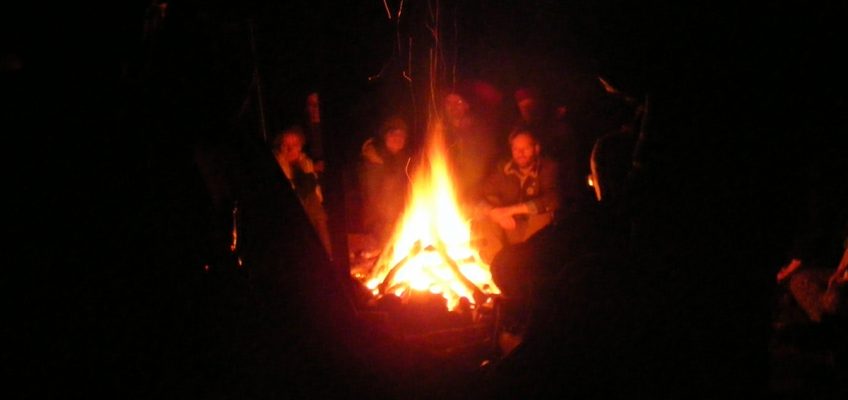
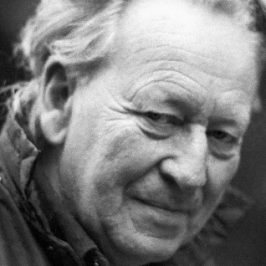


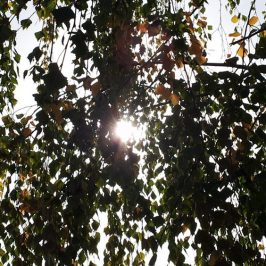
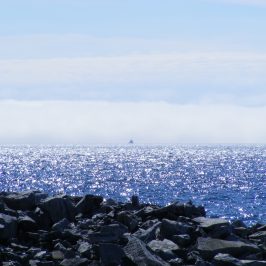
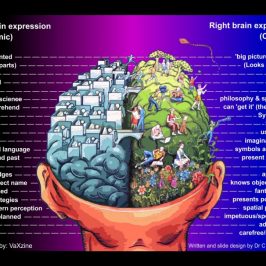
Leave a Reply